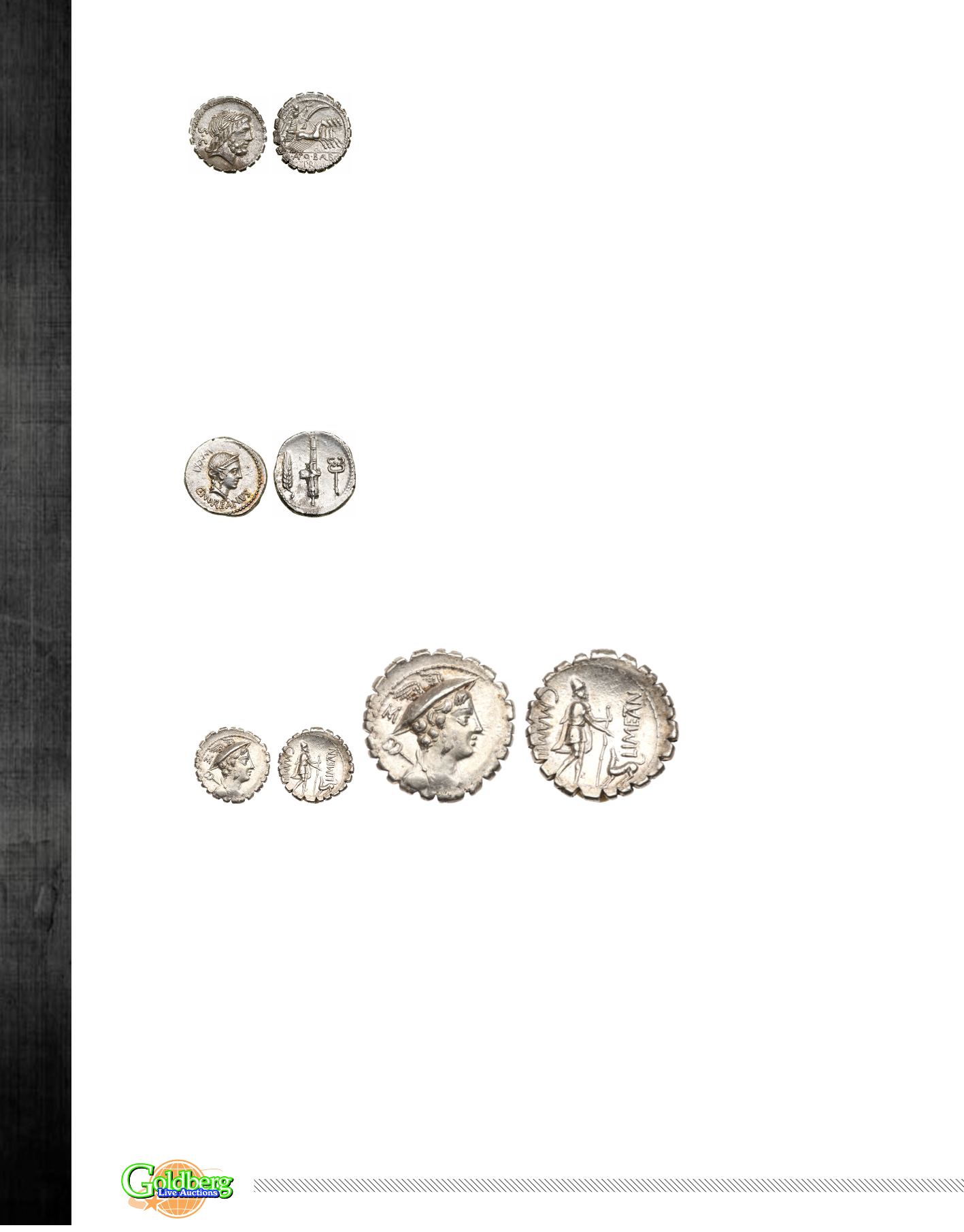

153
|
Session Five - Tuesday, February 14th 10:00am PST
1960
Q. Antonius Balbus. Silver Denarius (3.82 g), 83-82 BC
.
Rome. S C behind, laureate head of Jupiter right.
Reverse:
Q
(ANT)O B(AL)B / PR in two lines in exergue, Victory, holding
wreath and palm, driving galloping quadriga right. Crawford
364/1d; Sydenham 742b; Antonia 1. Well struck.
Extremely
Fine
.
Estimate Value ......................................................$250 - 300
Q. Antonius Balbus was a Marian loyalist who was appointed
praetor in Sardinia in 82 BC The obverse marking S C shows the
issue was struck
ex senatus consulto
, that is, by special decree
of the Senate, and presumably forms part of the preparations to
resist the return of Sulla. Balbus was subsequently defeated at
his post in Sardinia by Sulla' s legate, L. Philippus, and died in
the battle.
1961
C. Norbanus. Silver Denarius (3.91 g), 83 BC
. Rome. C
NORBANVS below, diademed head of Venus right; behind,
TXXXI.
Reverse:
Grain ear, fasces, and caduceus. Crawford 357/
1b; Sydenham 739; Norbana 2. Lustrous and lightly toned.
Some weakness around edge.
Extremely Fine
.
Estimate Value ......................................................$250 - 300
Enlargement
1962 C. Mamilius C.f. Limetanus. Silver Denarius (3.84 g), 82 BC
. Rome. Draped bust of Mercury right, wearing winged petasus; behind, A
above caduceus.
Reverse:
C MAMIL LIME(TA)N, Ulysses advancing right, holding staff and extending hand to his dog Argus come to greet him.
Crawford 362/1; Sydenham 741; Mamilia 6. Lustrous.
Superb Extremely Fine
.
Estimate Value .............................................................................................................................................................................$400 - 500
The Aurora Family Collection, purchased in 1969.
The types on this coin allude to the moneyer' s claim to descent from Telegonus, son of Ulysses and Circe, and hence from the god Mercury. The
reverse features a sadly endearing scene from the Odyssey, when Odyseeus returns home after twenty years disguised as a beggar and his old
dog, who had been neglected, recognizes him: "So they spoke. And a dog, lying there, lifted its head and pricked up its ears. Argus was the hound
of noble Odysseus, who had bred him himself, though he sailed to sacred Ilium before he could enjoy his company. Once the young men used to
take the dog out after wild goat, deer and hare, but with his master gone he lay neglected by the gate, among the heaps of mule and cattle dung
that Odysseus' men would later use to manure the fields. There, plagued by ticks, lay Argus the hound. But suddenly aware of Odysseus' pres-
ence, he wagged his tail and flattened his ears, though no longer strong enough to crawl to his master. Odysseus turned his face aside and hiding
it from Eumaeus wiped away a tear then quickly said: ' Eumaeus, it' s strange indeed to see this dog lying in the dung. He' s finely built, but I can'
t tell if he had speed to match or was only a dog fed from the table, kept by his master for show.' "Then, Eumaeus, the swineherd, you replied: '
Yes this dog belongs to a man who has died far away. If he had the form and vigour he had when Odysseus left for Troy you' d be amazed by the
speed and power. He was keen-scented on the trail, and no creature he started in the depths of the densest wood escaped him. But now he is in
a sad state, and his master has died far from his own country, and the thoughtless women neglect him. When their masters aren' t there to com-
mand them, servants don' t care about the quality of their work. Far-voiced Zeus takes half the good out of them, the day they become slaves.'
"With this he entered the stately house and walking straight into the hall joined the crowd of noble suitors. As for Argus, seeing Odysseus again in
this twentieth year, the hand of dark death seized him."(Homer,
Od.
XVII.290-327).



















